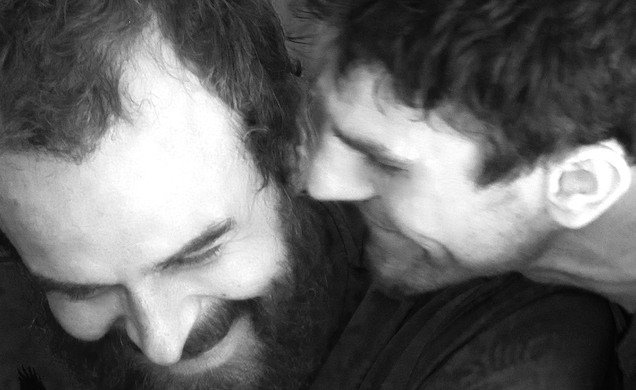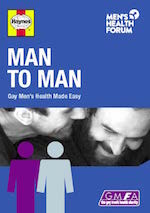Know Your Knob: all our penis health links
The Gay Man's Good Sex Guide

I’m scared of bottoming
Most gay men will consider bottoming at some time. However, the thought of doing it for the first time can be scary. Don’t let that put you off.
You may prefer to douche before bottoming, especially if indulging in deep arse play like fisting or with large dicks/toys. Use plain, clean water, preferably at body temperature. Avoid using shower attachments - the water pressure can be dangerous. You can get douche bulbs online or from any good sex shop. Try not to go overboard and irritate the lining of your arse, as this can make you more vulnerable to STIs.
Get yourself relaxed with lots of foreplay like rimming or fingering. Some men do use amyl nitrate (poppers) to relax the muscles around their arse but there are two major health warnings. Poppers:
- have been linked with an increased risk of HIV transmission
- don’t mix with erection drugs like Viagra and may cause a heart attack.
Deep breathing is far safer, helps you to relax and relaxes the arse too.
Find a position that suits the size, angle and curvature of your partner’s dick. Any position where your knees are bent and drawn into your chest, whether you are kneeling, lying on your back or on your side, will probably lead to more comfortable sex, or will be a good position to start from.
There’s no such thing as too much lube. It just makes everything more slippery, which isn’t a bad thing. Use water- or silicone-based lubricants if you're using latex condoms. Avoid any lube with nonoxynol-9. It irritates the lining of the arse, may make sex more painful and also increases your risk of HIV.
Look after your arse. You can't get a new one. So know your limits. With time you may be able to take larger objects but there's always a maximum size: about 4-5 inches diameter (the width of your pelvic opening).
How can I be a great top?
Take your time and listen to your partner. This is as much about the emotional as the physical side. If he’s nervous, he might want reassuring that you’re not going to hurt him and that he’s in control.
Find out what he likes. For some guys, topping is about being dominant (and some bottoms like that), but for others, it’s a two-way street. Ask him how he likes it. Listen to his reactions too. If he’s making noises that suggest he's in pain, ease up a bit.
The first time you top, you may be a little anxious. This may make your erection less hard than usual. Relax – you're both there to enjoy yourselves. If you have erection problems, concentrate on something else like kissing for a while. (If getting or staying hard is a regular problem, see our section on ED on page 6.)
Our advice above on lubes and position apply as much to tops as to bottoms. Lube is essential when topping. If you have a bigger than average cock, any position where the cheeks of his arse can provide a buffer to your length (like him lying face down) will be a good bet until he’s used to it.
Remember: It’s not only bottoms at risk of HIV. Tops are at risk too, although it’s statistically less likely. Anal mucus can carry high concentrations of HIV, and the membrane just inside the tip of your cock and the foreskin can absorb that directly into the bloodstream if you fuck a guy's arse without a condom. You know the solution. Rubber up.
What is the Male G-Spot?
Some gay men call the prostate the ‘male G-spot’ as it is responsible for a lot of the pleasure you feel when getting fucked. Substances like steroids can also cause the prostate to enlarge. But there’s no evidence gay men are more or less likely to get prostate problems than straight men.
I'm going cruising
Don't put sex before safety. Trust your instinct about where and what isn't safe. Carry condoms and lube. (If bottoming, you might want to put the condom on the top yourself.)
Don't flash cash and make sure you know where the exits are.
What about HIV?
Men who have sex with men account for over half of HIV diagnoses in the UK.
It’s possible to have HIV without knowing it. Most men experience some symptoms around two to six weeks after infection (such as a sore throat, fever, body aches or rash). These symptoms are common to other illnesses and many people do not realise they could be a sign of HIV infection.
It’s estimated that 16% of HIV-positive gay men don’t know they have the virus.
If left untreated, HIV attacks the body’s immune system, leaving it vulnerable to infections we would normally fight off. There is no cure but, if you are diagnosed with HIV and treated, you should have a normal life expectancy.
HIV lives in the blood and in some body fluids. To get HIV, one of these fluids from someone with HIV has to get into your blood:
- cum and precum
- anal mucus (found inside your arse)
- blood.
Sex without condoms is the most likely way for gay men to become infected with HIV.
HIV can also be found in vaginal fluids, including menstrual blood, and breast milk.
You can’t get HIV from:
- kissing
- spitting
- being bitten
- contact with unbroken, healthy skin
- being sneezed on
- sharing baths, towels or cutlery
- using the same toilets and swimming pools
- mouth-to-mouth resuscitation
- animals or insects like mosquitoes.
The more HIV someone has in their bodily fluids, the more infectious they are, and the more likely they are to have serious health problems. HIV treatment lowers the levels of HIV in the body and can make the carrier less infectious, but it won’t get rid of the virus completely.
Men who have sex with men should get tested roughly every six months for HIV. You can get tested at any sexual health clinic. A lot of places do one-hour testing or even quicker. It just involves a finger prick, so no worries about needles. You can also get home testing kits by post.
If you think you’ve been exposed to HIV, go to your local sexual health clinic or A&E as soon as possible, preferably within 48 hours. They will be able to prescribe you with a 28-day course of anti-HIV medication called post-exposure prophylaxis (PEP), which may prevent you from becoming infected with HIV.
HIV isn’t a death sentence, and many people with HIV live long and healthy lives with the right care. But that doesn’t mean it’s trivial. GMFA provides information and advice for gay men living with HIV on their website.
What is hepatitis?
Like HIV, the only signs of hepatitis — a blood-borne liver disease — may be a short flu-like illness. There are three sexually-transmitted forms of hepatitis (hep): A, B and C.
There are vaccines for Hep A and B. These will usually clear up on their own (although you should seek advice just in case yours doesn’t).
Less common but potentially more serious is Hep C. There is no vaccine and it won’t clear up on its own.
All of these activities can transmit hepatitis:
- unprotected sex
- rimming
- fingering
- sharing toys
- fisting
- group sex
- sex without condoms
- sharing needles or drug straws.
I keep hearing about monkeypox.
Monkeypox is an infection that can be passed during sexual contact, kissing, cuddling or holding hands or even through touching clothing, bedding or towels used by someone who is infected.
It is rare and is most common in west Africa but it has been in the UK news as cases have increased in the UK during 2022, particularly among men who have sex with men. If you're concerned, it is worth finding out more from the NHS as the NHS is offering the smallpox (MVA) vaccination to people who are most likely to be exposed to monkeypox.
Where can I find out more about penis health?
Know Your Knob: all our penis health links
Free PDF of Size Isn't Everything - all penis FAQs answered
Any other links?
There’s also more on sexual health and sexual pleasure on the website of our partner organisation: GMFA, the gay men's health charity.
MAIN IMAGE: Fuzzy and Warm by David Goehring licensed under CC BY 2.0
We don't currently post comments online but are always keen to hear your feedback
| This content is wholly based on the Men's Health Forum's man manual Man To Man which was prepared in line with the NHS England Information Standard of which the MHF is a member. Follow the links for more information or to buy copies. Additional references on monkeypox below. |
Date published
01/07/15
Date of last review
31/05/15
Date of next review
31/05/18
References
|
The Men’s Health Forum need your support It’s tough for men to ask for help but if you don’t ask when you need it, things generally only get worse. So we’re asking. In the UK, one man in five dies before the age of 65. If we had health policies and services that better reflected the needs of the whole population, it might not be like that. But it is. Policies and services and indeed men have been like this for a long time and they don’t change overnight just because we want them to. It’s true that the UK’s men don’t have it bad compared to some other groups. We’re not asking you to ‘feel sorry’ for men or put them first. We’re talking here about something more complicated, something that falls outside the traditional charity fund-raising model of ‘doing something for those less fortunate than ourselves’. That model raises money but it seldom changes much. We’re talking about changing the way we look at the world. There is nothing inevitable about premature male death. Services accessible to all, a population better informed. These would benefit everyone - rich and poor, young and old, male and female - and that’s what we’re campaigning for. We’re not asking you to look at images of pity, we’re just asking you to look around at the society you live in, at the men you know and at the families with sons, fathers and grandads missing. Here’s our fund-raising page - please chip in if you can. |




